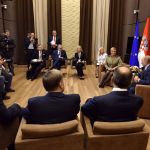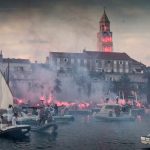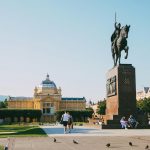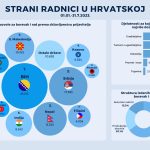ZAGREB, January 16, 2019 – Russia respects Serbia’s choice to join the European Union and is not trying to impose an artificial choice, either Russia or the EU, Russian President Vladimir Putin has told Belgrade media, adding that his country has many friends in the Balkans and that Serbia has a special place among them as a strategic partner.
Russia “knows and understands how complicated the Balkans and its history is, but has always considered this region as one for constructive cooperation,” Putin was quoted as saying in an interview with Politika and Večernje Novosti ahead of an official visit to Belgrade on Thursday.
“When we talk about the situation in the Balkans, a serious factor of destabilisation is the policy of the US and some Western countries which is aimed at strengthening their domination in the region,” he says, mentioning NATO’s strikes against Yugoslavia in 1999, Kosovo’s separation from Serbia and the “illegitimate recognition” of Kosovo’s independence, “dragging Montenegro into NATO”, and forcing Macedonia’s accession to NATO and a change of its name contrary to the will of its citizens.
“Russia has many friends here, among which the strategic partner Serbia holds a special place. That’s why helping to strengthen regional security and stability is our unconditional priority,” Putin says, adding that Moscow pushes for “respecting the rights and interests of Balkan countries and nations, for respecting international law.”
He says “the relations with Slovenia and Croatia are developing progressively, regardless of the fact that the dialogue between the EU, of which they are member states, and Russia is experiencing hard times.”
He recalls that Russian and Croatian leaderships held several meetings last year and points out that economic relations have improved. “Trade is growing, with Slovenia it went up by almost 10% for three quarters in 2018 and with Croatia by 27%. Last year, Russia and Slovenia successfully organised seasons of culture, and a big Hermitage exhibition was organised in Zagreb, dedicated to the 50th anniversary of brotherly ties between Croatia’s capital and Saint Petersburg.”
Speaking of Russian-Serbian trade, Putin says it was 2 billion dollars in 2017 and that it continued to increase last year, and that Russian investments in Serbia’s economy have exceeded 4 billion dollars. Cooperation with Gazprom Neft has enabled Serbia’s NIS oil industry to become a leader on the Balkans energy market, he adds.
Putin says Serbia might be part of the TurkStream natural gas pipeline as a client and as a transit state to Europe given that Gazprom is considering various options of extending the land transit line to Europe, one of them being Bulgaria-Serbia-Hungary with a connection to the gas distribution centre in Baumgarten, Austria.
He says the European Commission’s position will be taken into account when the Russian gas delivery route is finally defined. “We believe the EU member states interested in Russian gas should receive the EU’s guarantee that plans to extend TurkStream won’t be thwarted by an arbitrary political decision in Brussels.”
Putin was also quoted as saying that Moscow “highly appreciates the Serbian leadership’s firm commitment to keeping the country’s neutrality” and that for years it “has been helping to strengthen Serbia’s defence capabilities” through weapons deliveries and military equipment upgrades, which it will continue to do.
Putin says the Kremlin was “surprised by the EU’s quite passive response” to the Kosovo parliament’s decision “to transform the Kosovo security forces into a real army,” which he says Kosovo Serbs saw as a “direct threat to their security.”
“That move creates the serious risk of the situation in the region becoming strained. It is hardly in the EU’s interest to close its eyes before such unilateral actions which grossly breach international law, notably if Brussels counts on continuing to fulfil its obligation as mediator in the dialogue between Belgrade and Pristina,” Putin was quoted as saying.
He sees NATO expansion as a legacy of the Cold War and as a wrong and destructive military and political strategy. “NATO is trying to boost its presence in the Balkans. But thereby it is only renewing the division lines on the European continent,” he says, adding that all that does not lead to stronger stability but “less trust and growing tensions in Europe.”
More news on the relations between Croatia and Russia can be found in the Politics section.








